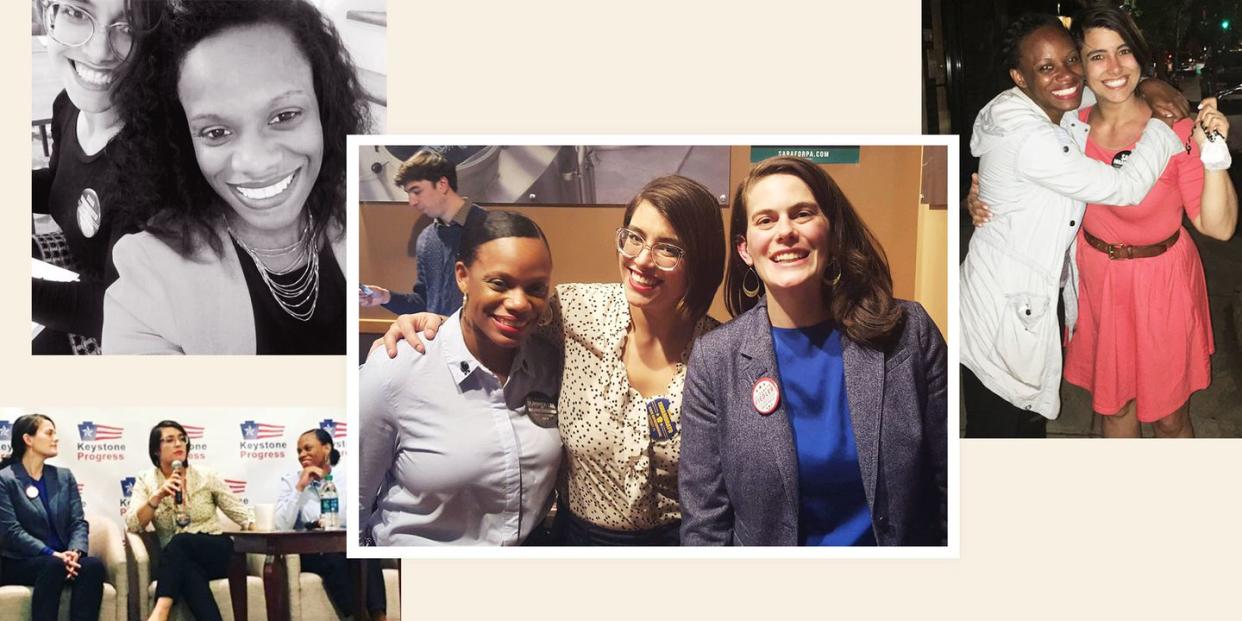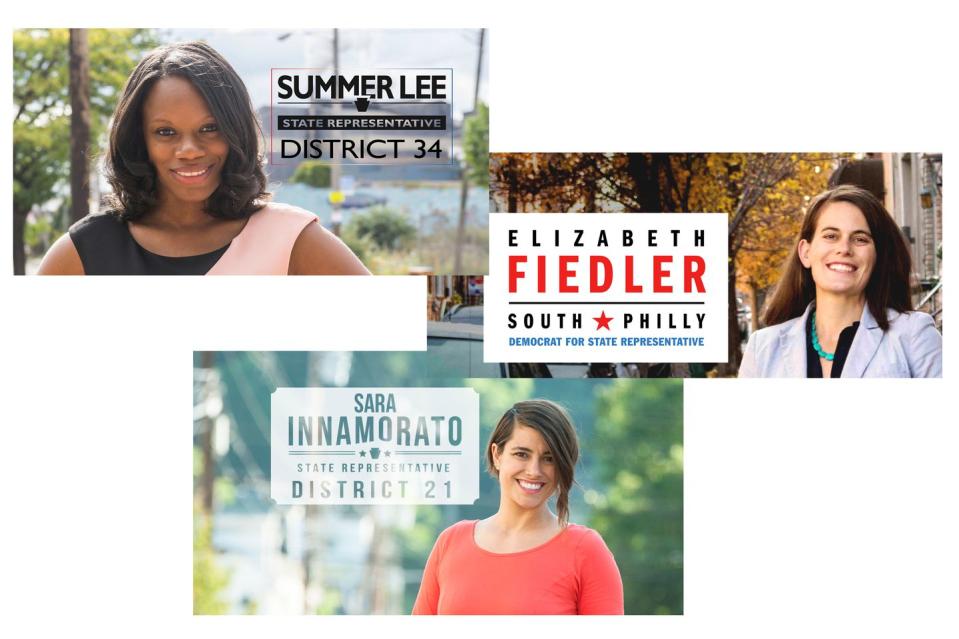How Female Friendship Helped These Candidates Win

It's ubiquitous. Find any group of modern, even slightly tech-savvy women-especially those that need to stay connected while miles apart-and, chances are, you will also find a group chat. Sometimes funny, sometimes sad, it's a consistent emblem of the 21st century girl gang, and one that happened to send a group of Pennsylvania State House candidates into a stream of giggles.
I first heard about Elizabeth Fiedler, Sara Innamorato, and Summer Lee right after they all won their primaries; The New Yorker painted these three first-time progressive candidates as women to know-they're all endorsed by the Democratic Socialists of America-explaining that through their campaigns they became fast friends, bonding over their similar platforms and shared experiences.
So shortly after their victories, we all shared a Skype call, and I watched them scroll through their chat, trying to explain the inner-workings of their friendship: Fiedler mentions that she doesn't "even know how to do GIFs," and later references a Will Ferrell "emoji" sent by Innamorato. Innamorato says she sends selfies and admits to a particular photo series that involved her finding a stack of Fiedler's signs and putting them all around her office. Lee says, "Liz would sometimes send a pictures of her kids," but ultimately confesses the three of them are "low-key lame."
A post shared by Summer L. Lee (@_sojourner2_) on Feb 3, 2018 at 11:56am PST
But the truth is that they're not lame-they're busy. They've been campaigning around the clock trying to get to Harrisburg-and it's working.
Fiedler, who's running for House District 184 in South Philadelphia, announced she was running in September, only a few months after she left her job as a reporter for an NPR station. She has two sons under the age of four (hence the group chat photos).
Innamorato, who's running for House District 21 on the other side of the state, grew up in the district and lost her father, who was addicted to opioids, in her early 20s. She went on be a co-founder of She Runs Southwestern PA, which encourages women to run for office, and then ended up running herself.
And not far from Innamorato is Lee, who's running for House District 34. She's from a Pennsylvania steel town and says she spent much of her time at law school studying the cyclical nature of racism and structural inequality, and quickly realized how her own town fit into the trend. After Bernie Sanders lost, she organized with the Hillary Clinton campaign in Pittsburgh, and now she could be the first black woman from southwestern Pennsylvania elected to the State House, a fact she admits is outrageous: "Those perspectives are needed, and that's why things don't get done for us. Because who's going to prioritize our communities but us?”

The three first met back in February at the Keystone Progress Summit where they were on a panel together and held a joint fundraiser-but they knew about each other before then.
"I remember finding out about Liz, and I was like, I need to find her phone number," Innamorato recalls. "And I remember because I was in a closet at work calling you."
"I was on the bus going home from work," Fiedler adds. "I remember this very clearly."
"And I was like, 'Tell me what you're doing,'" Innamorato said. "We're both running against ex-cops, let's talk about that."
It's this kind of connection, they say, that helped them fight through to election day.
"I had amazing volunteers, amazing staff. But running for office is really-it can feel really lonely sometimes," Fiedler says. "When you're out there knocking doors, it's raining, you're going to community meetings... it can be exhausting and tiring and it was just when we would text or talk that was helpful. You were hours away, but you were doing the same thing for the same reasons."
For Lee, it was another reason to keep fighting, to keep knocking on doors, but it was also a critical element to the election cycle: "I feel like if maybe one of us didn't run, or maybe one of us didn't win, it would be a completely different narrative. Often times you'll get one woman or one person of color going to Harrisburg at one time, and they're drowned out. They get there, and they're completely overwhelmed by just the negativity and the toxicity in that place. That we are all going together, that we already have these relationships, that we've already been running together, I think that that is going to make us so much stronger and formidable."
But it was more than just words, though they admit that they often acted as each other's cheerleaders. They also divided resources. Because Lee and Innamarto were so close to each other, they were able to share volunteers and interns. They combined forces with Lee contributing her law expertise and Innamarto sharing her knowledge of fundraising. "It's finding out where our strengths are and how that can lift one another up," Innamorato said. "It was always about sharing and not succumbing to the false narrative of scarcity [that] if I get my message elevated that means Summer or Liz's can't be."
#SaraLee on the radio #norestfortheweary #summerforpa #saraforpa
A post shared by Summer L. Lee (@_sojourner2_) on May 24, 2018 at 5:05pm PDT
Their strategies proved successful; The New Yorker reported that more than 30 percent of voters showed up for their races, as opposed to the typical 18 percent. When talking about their tactics, they all repeat similar messages: They knocked on tens of thousands of doors. They kept their message consistent, from white affluent suburbs to poorer, disinvested communities. They didn't write anyone off and talked to everyone they could.
And in a year when women are continuing to win primaries across the country, their victories are representative of a larger trend. According to the Center for American Women and Politics at Rutgers University, Pennsylvania only had six women running for congressional or statewide office in 2016; this year there are 26 women running and 21 are Democrats.
"For a long time, we had been accepting this system sending us candidates, but not sending it our candidates," Lee said. "I think this is the shift, and the more we get these victories, the more we see these women and people of color winning, I think we're really going to see a huge shift in these next two cycles. And I'm happy the three of us were a part of that."
You Might Also Like

